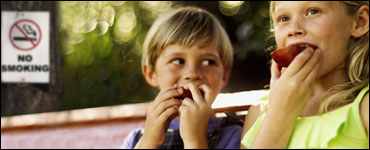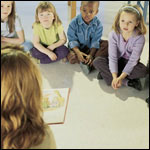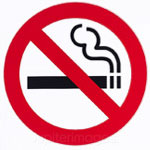CDC Features
Current Features
World Cancer Campaign: Give Your Child a Smoke-Free Childhood

February 4th, 2008, is World Cancer Day!

World Cancer Day is the start of a World Cancer Campaign to protect children around the world from secondhand smoke. The Centers for Disease Control and Prevention joins the International Union Against Cancer* and many other organizations in launching a global campaign to raise public awareness about the need to protect all children from secondhand smoke.
World Cancer Day has a simple message for parents: "Second-hand smoke is a health hazard for you and your family. There is no safe level of exposure to secondhand smoke. Give your child a smoke-free childhood."
The 2006 Surgeon General's Report on The Health Consequences of Involuntary Exposure to Tobacco Smoke concluded there is no risk-free level of exposure to secondhand smoke. Secondhand smoke exposure among children and nonsmoking adults remains a major public health problem. Eliminating smoking in indoor spaces is the only way to fully protect nonsmokers from secondhand smoke.
What You Can Do To Protect Kids from Secondhand Smoke
Sadly, children are powerless to protect themselves from the dangers of secondhand smoke. But we each can play an important role in protecting them from secondhand smoke exposure.
• Make your home and vehicle smoke-free at all times. If there are smokers in your family, they should always go outside to smoke. Opening a window is not enough.
• Make sure your children's day care centers and schools are 100% smoke- and tobacco-free.
• Insist that no one smokes around your children.
• Choose smoke-free restaurants.

And the single best step you can take to protect your family's health and your own is to quit smoking. Quitting smoking will also reduce the chance that your children will grow up to become smokers themselves.
While quitting smoking may be difficult, there are a number of proven resources available to help including free counseling and a range of FDA-approved medications. To receive free counseling to help you quit, please call 1-800-QUIT-NOW.
For more information on cancer around the world and tobacco as a risk factor for cancer, visit the Global Cancer Atlas Online. This interactive Atlas provides colorful maps and charts on cancer around the world, as well as information on prevention strategies and cancer risk factors. It provides compelling cancer data from around the world by nation, with interactive maps and graphics on the global impact of cancer.
The Global Cancer Atlas Online is an interactive version of The Cancer Atlas, published in 2006 by the American Cancer Society* with support from the CDC.
For More Information
- Cancer Prevention and Control; in Spanish, Prevención y Control del Cáncer
- Secondhand Smoke
- 2006 Surgeon General's Report—The Health Consequences of Involuntary Exposure to Tobacco Smoke
- World Cancer Campaign*
- World Cancer Day*
*Links to non-federal organizations are provided solely as a service to our users. These links do not constitute an endorsement of these organizations or their programs by CDC or the federal government, and none should be inferred. CDC is not responsible for the content of the individual organization Web pages found at these links.
Page last updated: February 4, 2008
Content source: Division of Cancer Prevention and Control
Content owner: National Center for Health Marketing
URL for this page: www.cdc.gov/Features/WorldCancerDay/

